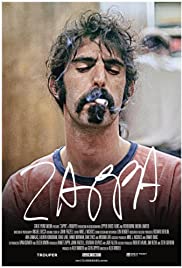
ZAPPA
US, 2020, 129 minutes, Colour.
Directed by Alex Winter.
Audiences will come to this documentary-portrait with different expectations. Many, younger, since it is almost 30 years since the death of Frank Zappa, may not know him at all. Others will have heard of him but his life and music not registering. And, there will be those who know his life and music, who have great admiration, who are critical, who want to be reminded of who he was, his musical heritage, what he achieved.
All potential audiences will not be disappointed.
Alex Winter is a long-time actor (best known for Bill and Ted) but also a long-time documentary director. He has known show business for many decades. And that is evident here in the range of talking heads incorporated into the documentary, Zappa’s wife and children, colleagues, co-workers, and a range of celebrities who knew him and/or have opinions about him.
Frank Zappa was born in 1940, died in 1993, a significant 50 years, a half-century of the second part of the 20th century. As we go through his career, the background of his life is built up, Italian origins, migrant tradition, grew up in the 40s, educated in the 1950s. Ready to enter into the enormous changes of the 1960s. While he lived something of a wild lifestyle, in common with many rock stars, he did not consider himself hippy and his style, was against drugs. In fact, he was something of a perfectionist in his work and in his expectations of himself and others.
It is surprising for those not familiar with him and his work, that he was such an international figure, excerpts throughout this film from various concerts, especially in different countries of Europe, early in the piece making significant contribution to Czechoslovakia and the politics following the fall of the Berlin Wall and the collapse of the Soviet Empire.
Of course, a great deal of attention is given to his music. While he had quite a range of rock music and performance, this was not exclusive. In fact, a lot of attention is given to the influence of the idiosyncratic composer, Varese, his notations, his sounds, his compositions. Which means that the Zappa was something of a classical composer – and, once again, there are a number of excerpts of performances of this style of music and communication.
We see the founding of the Mothers of Invention – and recurring talking heads of a great number of musicians who worked with Zappa – and who say he changed their lives and careers, especially the devoted Ruth Underwod.
On stage, however, there was a variety of impressions an impact, music theatre, performance art, the touches of cruelty, theatre of the absurd. And, in dire ways, the absurd entered his life with severe accidents and long convalescent periods.
Out of the limelight, just as himself, Frank Zappa seems to give an impression ordinariness – this is particularly the case when he is interviewed about his wife and relationship with her, his pride in his children, some clashes in production and interpretation with his daughter, Moon, his being sometimes distant, not hugging, at other times proud of his children. But the calm Zappa is seen especially when he is showing the director and the crew around his archive. And, it is an enormous archive of his compositions, recordings, performances, all meticulously ordered and dated, his wanting to have a record of his life, for himself more than for others.
Throughout the film there are clay figures. The story is told about who was a sculptor in clay, Bruce Bickford, encountered Zappa, created figurines, delighted Zappa and became part of his entourage, a significant figure in Zappa’s life and career.
This review is not familiar with Frank Zappa at all, except for his name and for passing references and the suggestion of touches of weirdness.
Many audiences, unfamiliar with Zappa, will join with this reviewer and be thankful for such a rich dramatic portrait, the heritage of music, the cultural challenges of the second part of the 20th century.